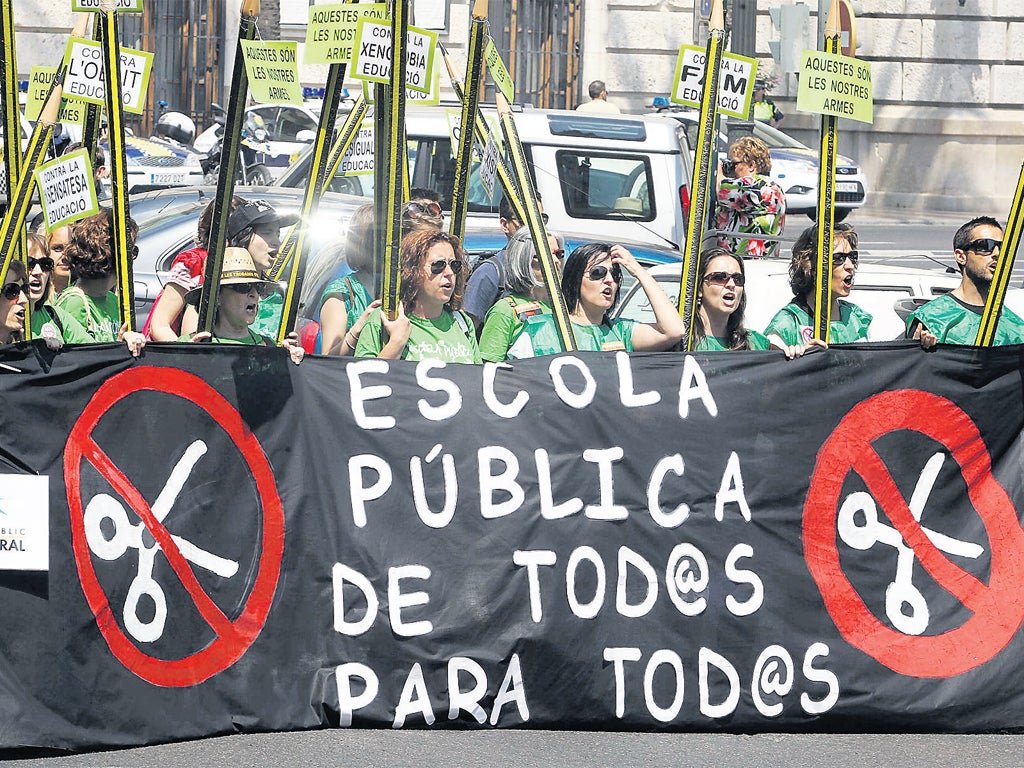Your support helps us to tell the story
From reproductive rights to climate change to Big Tech, The Independent is on the ground when the story is developing. Whether it's investigating the financials of Elon Musk's pro-Trump PAC or producing our latest documentary, 'The A Word', which shines a light on the American women fighting for reproductive rights, we know how important it is to parse out the facts from the messaging.
At such a critical moment in US history, we need reporters on the ground. Your donation allows us to keep sending journalists to speak to both sides of the story.
The Independent is trusted by Americans across the entire political spectrum. And unlike many other quality news outlets, we choose not to lock Americans out of our reporting and analysis with paywalls. We believe quality journalism should be available to everyone, paid for by those who can afford it.
Your support makes all the difference.The flames of the eurozone crisis leapt higher, as fears spread about the state of the continent's most vulnerable banks.
Shares in the Spanish lender, Bankia, plummeted 30 per cent at one stage in trading, following a report that customers had withdrawn €1bn in deposits since the Madrid government was forced to part nationalise the bank last week.
Bankia released a statement saying the deposit fall was simply a seasonal effect rather than a bank run. This served to stabilise the share price, but the lender still ended up losing 14 per cent of its value. There were also rumours last night that the credit rating agency Moody's was preparing to downgrade a host of Spanish banks, a move that could push up their costs of funding.
Yesterday's Spanish panic followed a warning on Wednesday from the Greek President, Karolos Papoulias, that savers have withdrawn €700m from the Greek banking system since that nation's inconclusive election result on 6 May. Markets have also been spooked by revelations that Greek banks are now unable to access certain forms of liquidity support from the European Central Bank. The fragile European financial system has moved to the centre of the European sovereign debt crisis. The dominant fear is that a Greek exit from the eurozone will prompt a series of runs on weaker banks across the continent and forcing nations such as Spain and Italy to seek official assistance from the eurozone and the IMF. The Spanish banking sector is a particular source of alarm. Analysts estimate that the nation's lenders could be sitting on unrecognised bad property loans of up to €100bn.
In Athens yesterday, a caretaker government made up of academics and diplomats was sworn in after the largest political parties failed to form a coalition. The interim Greek cabinet includes a former head of the army, Frangos Frangoulis and Antonios Manitakis, a professor of constitutional law. This administration, led by senior judge Panagiotis Pirkrammenos, will run Greece until new elections are held on 17 June.
Last night, Fitch ratings agency downgraded Greece deeper into junk territory, warning of a "probable" Greek exit from the euro currency union if new national elections next month produce an anti-bailout government. Fitch said it had cut Greece's rating by one notch, from B- to CCC, the lowest possible grade for a country that is not in default.
In New York, president of the European Commission, Jose Manuel Barroso, was due to pledge support to Greek people, provided they honoured their commitments, in a speech to the UN. A pre-released text said: "We want Greece to stay in the euro area and the EU will do all it takes to ensure it...We will honour our commitments toward Greece and we expect the Greek government – current and future – to fulfil jointly agreed conditions for financial assistance."

Join our commenting forum
Join thought-provoking conversations, follow other Independent readers and see their replies
Comments